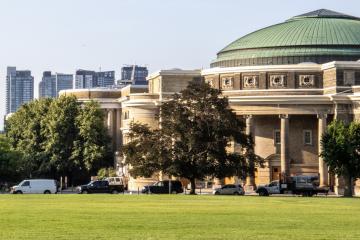
Pailin Chiaranunt and Peter Serles (supplied images)
Pailin Chiaranunt and Peter Serles named 2024 Schmidt Science Fellows
Published: April 24, 2024
Pailin Chiaranunt and Peter Serles, both of whom carried out doctoral research at the University of Toronto, have been named in recognition of their efforts to wield interdisciplinary research to drive sector-wide change.
Schmidt Science Fellows is an initiative of Schmidt Sciences, a philanthropic organization founded by Eric and Wendy Schmidt to advance scientific exploration and discovery and develop solutions to global issues. The program is delivered in partnership with the Rhodes Trust.
"It's at the edges of things – ecosystems, borders, disciplines – where the most interesting ideas are developed, solutions that don't arise from any single approach," said Wendy Schmidt in a press release. "We're excited to welcome the 2024 cohort of Schmidt Science Fellows to approach these edges, look at problems anew, share insights with each other and the world and, we hope, go on to develop solutions to some of humanity's most pressing challenges."
Chiaranunt and Serles join a cohort of 32 fellows who will undertake a year-long science leadership program to prepare them to join the next generation of interdisciplinary science leaders, alongside a one to two-year research placement at a new institution.
“To address the world's greatest challenges today, I believe that we need an interdisciplinary and collaborative approach to science,” said Chiaranunt, who completed her PhD in immunology at the Temerty Faculty of Medicine and is conducting post-doctoral research at the University of California, San Francisco. “I am delighted that the Schmidt Science Fellows program appreciates these values, and I'm excited to use this unique opportunity to study how inflammation and infection can impact brain health – a growing crisis in today's post-pandemic world.”
“Being given the freedom and support to work on high-risk, high-reward research will allow me to ask the biggest questions I can and develop entirely new areas of expertise that I can eventually bring back to Canada,” said Serles, who is set to graduate from the Faculty of Applied Science & Engineering with a PhD in June, and will take on a post-doctoral fellowship at the California Institute of Technology. “Nano-3D-printed scaffolds for neural organoids combines cutting edge-technologies in mechanical engineering and neuroscience to, hopefully, solve some of our most pressing issues."



